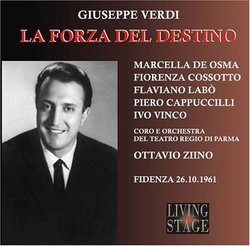| All Artists: Giuseppe Verdi, Ottavio Ziino, Parma Region Theater Orchestra & Chorus, Claudio Scarlini, Fiorenza Cossotto, Flaviano Labò, Guido Mazzini, Ivo Vinco, Marcella De Osma, Piero Cappuccilli, Silvio Maionica Title: Verdi: La Forza del Destino / Ziino (1961) Members Wishing: 0 Total Copies: 0 Label: Living Stage Original Release Date: 1/1/2006 Re-Release Date: 7/25/2006 Album Type: Import Genre: Classical Style: Opera & Classical Vocal Number of Discs: 2 SwapaCD Credits: 2 UPCs: 675754924027, 3830025710618 |
Search - Giuseppe Verdi, Ottavio Ziino, Parma Region Theater Orchestra & Chorus :: Verdi: La Forza del Destino / Ziino (1961)
 | Giuseppe Verdi, Ottavio Ziino, Parma Region Theater Orchestra & Chorus Verdi: La Forza del Destino / Ziino (1961) Genre: Classical
|
Larger Image |
CD Details |
CD ReviewsBrava to Marcella de Osma, and to other great singers here, Impostazione | New York City Area | 02/08/2010 (5 out of 5 stars) "Because I am interested in discovering historic live recordings all the time, I have to find ways to incorporate this joy into my sometimes hectic schedule. So, this one played as I was falling asleep, and I do remember being surprised that the soprano sounded so much like Tebaldi. I was only paying a little attention, but I wanted more. So, in the car next day, I played Pace, mio dio, and the opening messa di voce was so wonderful that I thought trickery was involved. It wasn't. Marcella de Osma just had a fabulous vocal technique, and I mean really superb surpassing most sopranos of the era, the placement was mastered for the breath is not only controlled forward but she uses the [i] with tremendous skill. This is the old school Italian method, and the [i] is essential for mastering it. I thought of other sopranos, Tebaldi of course, but also Orianna Santunione and Germana di Giulio, for they all had a certain sound - different yes - but the same control of the "vecchio stile." Delightedly, I discovered online that Tebaldi, Santunione, and de Osma were students of Carmen Melis, whose entire vocal technique worked the placement of vowels, so kudos to one's ear. I am on the right track, but if I find de Osma technically superior to both Tebaldi and Santunione, understand, for her voice is as powerful as either, and far more limpid than Tebaldi's, and her ancient vocal method is more complete than Santunione, who depends on the nasal far too much at times resisting the absolute control of the joining the [i] to the [ng]. Her name is Spanish and she could be one of those sopranos like di Giulio from the Consalez tribe, yet another link to the old method.
As for her performance, she has good Verdi style, but is not always well received, perhaps because sometimes her tone turns acid, too loud with too much [i] for certain ears, and though her pianissimos are possibly the best I've heard for the sheer control of her volume (even surpassing S. Roman, and they are far more present (natural) than the equally soft Caballe, whose pianissimos, like Milanov, I am not partial to) but they are often too far above the pitch for comfort. As for the sheer volume on some of de Osma's acuti, I can only think of Eva Turner who seems to bring her notes up from the depths of the ocean - HUGE), but they are often cut short (Turner's never were) lessening her musical impact, and for true expression, she has a long way to go to reach the divine Muzio. Yet, la Vergine (missing a few bars) is wonderfully delivered, even moving. And, though the Italians "sat on their" hands, I admire Marcella de Osma for rarely in the 1960's was there such a singer, who mastered every technical phase of the singer's vocal Art. She even wrote a book on singing called "Il Cammino della Voce" containing only 41 pages, my shorter book contained about 70 pages and was criticized by some very dim witted souls, but the Ancient Vocal Method is so direct, so true, so natural, that mere pages for their own sake are an exercise in futility, helping no one, least of all the "vecchio stile" itself. Labo is wonderful, surpassing all the Alvaro's I've heard and equalling Gino Penno - and they like him adoring his prolonged high notes which he lavishes on [i]. Cossotto is good too with a Nilsson-like top that did not last long. Cappuccilli is also good and big voiced. Vinco is as ancient as time and technically wonderful, as they all are. Conducting, I just can't say at this time, nothing stood out. I do like this set; perfect technique, once learned and heard, can be remarkably seductive." |

 Track Listings (22) - Disc #1
Track Listings (22) - Disc #1